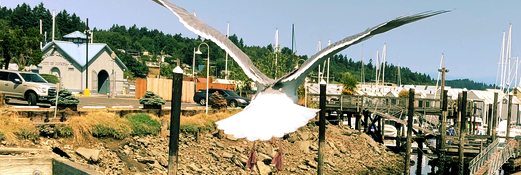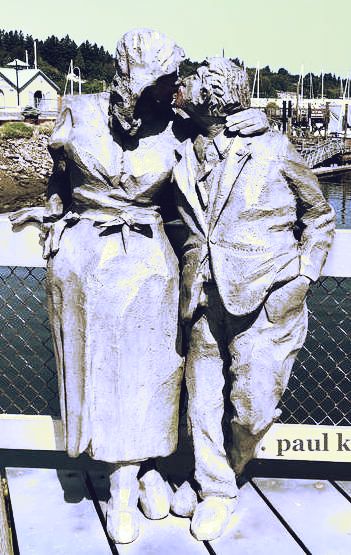
Paul Kameen Interview
Q: Your background actually isn’t in music and you are a retired professor from what I read. Can you talk a little bit about your history in general and tell us how it led to music?
A: I was an English professor for 40 years, most of that time at the University of Pittsburgh, wrote and published a lot of poetry and two scholarly books in my field. That, not music, was my profession and my intellectual life. About five years ago, my wife Carol developed health problems and then passed away suddenly and unexpectedly. I started singing and playing the guitar, without any preparation or training, during this time because it helped me to cope, first with both her stress and mine, as I sang for her, and then, even more so, with my grief at her passing. I was lost. One night, I just decided to record myself singing, mostly I think just to hear another voice, which is what mine sounded like being played back. It gradually evolved from there. About a year later, I started to make CDs for a few family and friends, who either enjoyed or tolerated my attempts, covers at first, then two albums of original songs along the way, which I posted to my website (and have since posted to Bandcamp). I wrote my first song about two years ago, out of the blue, a grim little thing called "Skin and Bones," and I just loved the whole process, the initial insight, the craft of making it work as a song, but mostly the opportunity to express my feelings, what was in there trying to find a way out. Not necessarily autobiographical truth, but emotional truth, making a song I believed in and felt I could make others believe in. Last spring, I retired and moved from Pittsburgh to Olympia, Washington, trying to re-start, get new bearings, and I wrote a burst of songs I liked right off the bat. I decided to put the album they turned into The Kiss on Bandcamp, my first foray into the public domain. I got some positive responses from listeners, one of which led me to Divide and Conquer.
Q: Can you talk about some of the musical inspiration behind your release The Kiss?
A: In general, inspiration for my songs comes spontaneously, I'm walking, watching TV, shopping, and a line pops into my head with a few notes, a sort of "tune," attached to it. As soon as I can, I pick up my guitar and try to see where it wants to go, write, sing, write, sing, until it's done, usually in a few days. The song, not me, is the one in control. I also sing tons of covers (how I got started), love making all kinds of music, big band, rock n’ roll, blues, country, bluegrass, spirituals, pretty much anything that can help me to coalesce a feeling inside me, get it centered in music, and then get it out into the air where I can experience it, hear it. I think all of that finds its way into The Kiss. As Matt Jenson says in DAC review, "it's all about the lyrics," the writing my strength, I think, much more so than the singing or playing. I just love making songs. It taps into everything I learned writing poems, but it's much less stressful, much more fun.
Q: I read a little about the themes of love that pop up on The Kiss. Can you expand on that?
A: When I got to Olympia, I kind of felt like I was falling in love, not with anyone in particular, more with this beautiful, new place, my chance to maybe start a new life here, the kinds of feelings you have when you're young, which was how I felt. My songs reflected this, emotionally, and I decided to make an album that might capture that aura of first falling in love, the excitement, the anxiety, the elation, the fear, the hope, the longing, all together at once. These songs are what came out. They are emotionally true to me, "earnest" and "directly from the heart," as Matt Jenson says in the review. I actually believe they could be factually true, if this were a better world or I were a luckier man. Both of those used to be factually true. Maybe they could be again, who knows? Stranger things have happened in my life.
Q: Your background actually isn’t in music and you are a retired professor from what I read. Can you talk a little bit about your history in general and tell us how it led to music?
A: I was an English professor for 40 years, most of that time at the University of Pittsburgh, wrote and published a lot of poetry and two scholarly books in my field. That, not music, was my profession and my intellectual life. About five years ago, my wife Carol developed health problems and then passed away suddenly and unexpectedly. I started singing and playing the guitar, without any preparation or training, during this time because it helped me to cope, first with both her stress and mine, as I sang for her, and then, even more so, with my grief at her passing. I was lost. One night, I just decided to record myself singing, mostly I think just to hear another voice, which is what mine sounded like being played back. It gradually evolved from there. About a year later, I started to make CDs for a few family and friends, who either enjoyed or tolerated my attempts, covers at first, then two albums of original songs along the way, which I posted to my website (and have since posted to Bandcamp). I wrote my first song about two years ago, out of the blue, a grim little thing called "Skin and Bones," and I just loved the whole process, the initial insight, the craft of making it work as a song, but mostly the opportunity to express my feelings, what was in there trying to find a way out. Not necessarily autobiographical truth, but emotional truth, making a song I believed in and felt I could make others believe in. Last spring, I retired and moved from Pittsburgh to Olympia, Washington, trying to re-start, get new bearings, and I wrote a burst of songs I liked right off the bat. I decided to put the album they turned into The Kiss on Bandcamp, my first foray into the public domain. I got some positive responses from listeners, one of which led me to Divide and Conquer.
Q: Can you talk about some of the musical inspiration behind your release The Kiss?
A: In general, inspiration for my songs comes spontaneously, I'm walking, watching TV, shopping, and a line pops into my head with a few notes, a sort of "tune," attached to it. As soon as I can, I pick up my guitar and try to see where it wants to go, write, sing, write, sing, until it's done, usually in a few days. The song, not me, is the one in control. I also sing tons of covers (how I got started), love making all kinds of music, big band, rock n’ roll, blues, country, bluegrass, spirituals, pretty much anything that can help me to coalesce a feeling inside me, get it centered in music, and then get it out into the air where I can experience it, hear it. I think all of that finds its way into The Kiss. As Matt Jenson says in DAC review, "it's all about the lyrics," the writing my strength, I think, much more so than the singing or playing. I just love making songs. It taps into everything I learned writing poems, but it's much less stressful, much more fun.
Q: I read a little about the themes of love that pop up on The Kiss. Can you expand on that?
A: When I got to Olympia, I kind of felt like I was falling in love, not with anyone in particular, more with this beautiful, new place, my chance to maybe start a new life here, the kinds of feelings you have when you're young, which was how I felt. My songs reflected this, emotionally, and I decided to make an album that might capture that aura of first falling in love, the excitement, the anxiety, the elation, the fear, the hope, the longing, all together at once. These songs are what came out. They are emotionally true to me, "earnest" and "directly from the heart," as Matt Jenson says in the review. I actually believe they could be factually true, if this were a better world or I were a luckier man. Both of those used to be factually true. Maybe they could be again, who knows? Stranger things have happened in my life.
|
Q: Do you currently play these songs live?
A: I am quite shy, reclusive by nature. I've never sung "live" for anyone except Carol, and even that made me nervous. After she passed, it took me a while to get comfortable even alone in front of my microphone. But I came to love that feeling of liberation, no inhibitions, just singing and singing until it all came out and I liked what I heard. It's my favorite thing to do now. When I have a fantasy about singing for an audience, it is in a dark bar, real late, maybe three people sitting there, drunk enough to want to feel the range of things, the light and the dark, that I sing about. Q: Have you considered playing with other additional musicians or will this be a complete solo project? A: I have no musical training or innate musical ability. None. I was told that over and over when I was in school. It's probably why I never tried it, even though I've always loved to have music in my ears and my head--until I got to that point, a few years ago, where I didn't care any longer what anyone else said or thought about what I was or did. But I don't have any connections at all in the music world/business. I do listen to other bands play as often as I can just because I enjoy it so much. I watch them sing and play and I'm amazed at what it's possible to do with voice and fingers. I aspire toward that, work to get better at it myself. If I were 18 now, though, that's what I'd be aiming to do with my life. Making music. Q: What else should we know about your music? A: As I often say, when asked: If you want to know me, really, the way I am now, having been through what I've been through, trying my best to keep on, then listen to my songs. If you like what you hear, then you "get" me. It's possible to do the same thing through the other kinds of writing I do, poetry, personal essays, even my scholarship. But here's what I think about that: I am a very good writer, spent my life honing those abilities to quite a fine edge. So you might admire my skill, but still not be moved in any way, allow me to connect with you. I am not a good singer or guitar player. If you are moved by my music, it's because you hear me, what's in there trying to get out, what I feel and want to share. You are open to it, to me, your great gift to me. Simple as that. |

